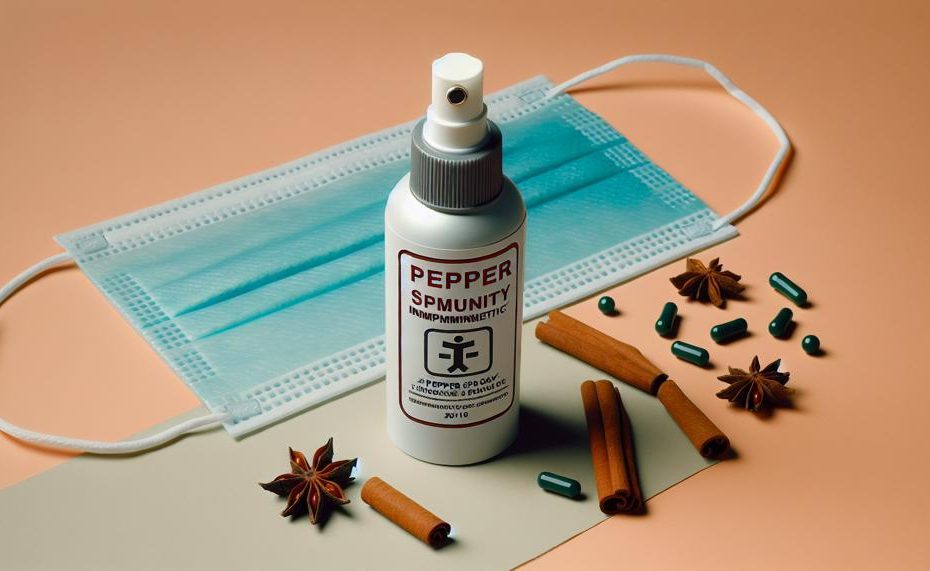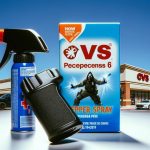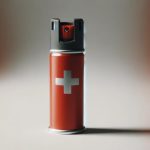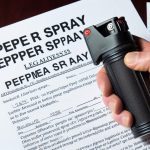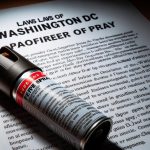Pepper spray, a popular and effective self-defense tool used by individuals around the world, is known for its potent effects on attackers.
However, amidst the concerns of personal safety, there is a question that arises – can someone become immune to the effects of pepper spray? This article will explore the possibility of developing immunity to pepper spray and shed light on the effectiveness of this widely embraced self-defense device.
Here’s what we’ll cover:
- The composition of pepper spray and how it affects the body
- The validity of “pepper spray immunity” and its implications
- Possible explanations for why some individuals may be immune
- Expert perspectives and firsthand accounts from those who claim immunity
So, let’s delve into the topic and discover if one can truly be immune to pepper spray.
Contents
- 1 Can You Be Immune To Pepper Spray?
- 2 Understanding the Science Behind Pepper Spray
- 3 Adaptation vs. Immunity: What’s the Difference?
- 4 The Potency of Pepper Spray as a Self-Defense Weapon
- 5 Can You Build Tolerance to Pepper Spray?
- 6 Bliss Ferdinand: Empowering Women and Promoting Personal Safety
- 7 Tips for Safely Purchasing and Carrying Pepper Spray
- 8 Conclusion
Can You Be Immune To Pepper Spray?
Some people believe that repeated exposure to pepper spray can make them immune to its effects. However, this is a misconception. While individuals may become more adapted to the sensation, it is not true immunity.
Various factors such as age, health status, and sensitivity all contribute to a person’s reaction to pepper spray.
| The Myth | The Reality |
| Repeated exposure to pepper spray leads to complete immunity. | Repeated exposure may lead to adaptation, but not complete immunity. |
| All pepper sprays have the same strength and potency. | Pepper sprays can range in strength from 0.18% to 10%. |
| Pepper spray affects everyone in the same way. | Individual factors such as age, health, and sensitivity can impact reactions to pepper spray. |
Furthermore, research has shown that the effects of pepper spray are temporary and typically last between 30 minutes to an hour. This is due to the chemical compound capsaicin found in pepper spray, which binds to pain receptors in the body and causes a burning sensation.
While repeated exposure may result in a less intense sensation, it does not mean that a person has developed immunity.
Understanding the Science Behind Pepper Spray
The effects of pepper spray on the body are not to be underestimated, as it can cause excruciating pain, burning sensations, and temporary blindness. Additionally, it can also trigger physiological responses such as a rapid increase in heart rate and elevated blood pressure.
While one may eventually develop some level of tolerance to pepper spray after repeated exposure, complete immunity is not possible.
The strength of the spray, an individual’s physical condition, and their tolerance level all contribute to their reaction towards pepper spray. It’s vital to keep in mind that pepper spray is a powerful chemical that can cause severe irritation and physiological reactions in the body.
Therefore, it should always be used responsibly and not relied upon as a method to build immunity.
Pepper spray is not just a mere self-defense tool but also a potent chemical that can cause significant harm to the human body. Many factors come into play when it comes to the effects of pepper spray on individuals. These include the strength of the spray itself, an individual’s physical condition and tolerance level towards such substances. Despite repeated exposure, one can only develop some level of tolerance but never complete immunity towards this chemical weapon.
Moreover, the physiological responses triggered by pepper spray can be alarming and potentially dangerous. The intense burning sensation, temporary blindness, increased heart rate, and elevated blood pressure are all part of the body’s response to this potent chemical.
While it may seem like a harmless tool for self-defense, it’s essential to handle pepper spray responsibly and avoid relying on it as a means to build immunity.
Adaptation vs. Immunity: What’s the Difference?
Adaptation, or the ability to adjust to a new environment or situation, plays a crucial role in our daily lives. For instance, when we are exposed to pepper spray, our bodies adapt to the effects of the chemical over time. This allows us to develop a tolerance and lessen the impact of the spray.
On the other hand, immunity is our body’s defense mechanism against harmful substances or infections. In the case of pepper spray, it means that our bodies have built up a resistance to its chemicals, making it less effective or even completely ineffective.
While adaptation may offer some level of protection, it does not guarantee complete immunity. This means that even with repeated exposure, we may still experience discomfort and pain when exposed to pepper spray. Achieving full immunity to pepper spray is highly unlikely and not recommended due to its powerful effects.
Additionally, while adaptation may provide temporary relief, it can have long-term consequences on our bodies. Therefore, it’s important to take necessary precautions and avoid repeated exposure to pepper spray for self-defense purposes.
Adaptation and immunity are two essential aspects that determine our response to environmental changes and threats. Adaptation allows us to cope with challenging situations, such as being exposed to pepper spray, by adjusting our bodies’ functions. However, immunity goes beyond adaptation as it involves developing a robust defense mechanism against harmful substances or infections.
In terms of pepper spray, achieving full immunity would mean that our bodies have successfully neutralized its chemicals, making it ineffective.
While adaptation may offer some level of protection against pepper spray, it’s essential to note that it does not guarantee complete immunity. Repeated exposure to pepper spray can still cause discomfort and pain, even for those who have adapted to its effects. This is because the chemicals in pepper spray are potent and can have long-term effects on our bodies.
Therefore, relying solely on adaptation for self-defense is not recommended.
The Potency of Pepper Spray as a Self-Defense Weapon
Pepper spray is an incredibly efficient tool for self-defense, causing intense pain, temporary blindness, and difficulty breathing. It is derived from chili peppers and contains capsaicinoids, the compound responsible for the burning sensation in spicy foods. When used against an attacker, it causes their eyes to tightly close, coughing, and tearing up, providing valuable time to escape or seek help. Its ability to incapacitate multiple attackers makes it a valuable asset for self-defense.
However, as with any self-defense weapon, proper caution and training are necessary when using pepper spray. Aiming carefully and being aware of your surroundings is crucial to avoid accidental exposure to bystanders or oneself. Wind can also disperse the spray, reducing its effectiveness.
One of the most common concerns regarding pepper spray is whether repeated exposure can cause immunity to its effects. While it is true that prolonged exposure can lead to reduced sensitivity over time, this process requires a significant amount of exposure and is not permanent.
Additionally, using pepper spray in self-defense situations should not result in repeated exposure that would lead to immunity.
Can You Build Tolerance to Pepper Spray?
Despite some claims, there is no evidence to support the idea that repeated exposure to pepper spray can build immunity or tolerance.
In fact, repeated exposure can have serious negative impacts on health, especially for children whose organs are still developing. These impacts may result in neurological damage, respiratory issues, and even mental health consequences such as trauma and fear towards law enforcement.
As such, it is crucial to handle pepper spray with care and only utilize it in cases of self-defense.
Can You Build Tolerance to Pepper Spray?
Some individuals may argue that frequent use of pepper spray can lead to a higher tolerance towards its effects. However, there is no scientific evidence to support this claim. In fact, repeated exposure to pepper spray can be extremely harmful to one’s health.
This is particularly concerning for children whose organs are still developing and can suffer from a variety of negative effects such as neurological damage, respiratory problems, and even mental health consequences like trauma and fear towards law enforcement.
Additionally, using pepper spray should only be done in self-defense situations. It is not a toy or a means of intimidation. The effects of pepper spray can have long-lasting consequences on both the victim and the perpetrator.
It is crucial to handle pepper spray with caution and only use it when absolutely necessary.
Bliss Ferdinand: Empowering Women and Promoting Personal Safety
Bliss Ferdinand, through her blog pepperspraymum.com, empowers women by equipping them with the essential knowledge and resources to safeguard themselves using pepper spray. She promotes personal safety by sharing her expertise and personal experience on effectively using pepper spray in self-defense situations.
Bliss Ferdinand’s dedication to promoting personal safety is evident on her blog, offering guidance on proper handling and using pepper spray. Her expertise and first-hand knowledge provide valuable insights for women seeking self-protection.
| 1. | Grasp the canister correctly | A proper grip on the canister ensures better aim and control when using pepper spray. |
| 2. | Target the attacker’s face | The face is the most vulnerable part of the body, and targeting it increases chances of incapacitating the attacker. |
| 3. | Spray in short bursts | Using short bursts ensures better accuracy and conserves pepper spray usage. |
| 4. | Vacate the attacker’s vicinity | After spraying, it is crucial to move away from the attacker and seek help immediately. |
Apart from mastering proper techniques, safety precautions are also essential when handling pepper spray. Bliss Ferdinand highlights the significance of understanding local laws and regulations, keeping it out of reach from children, storing it appropriately, and avoiding expired or damaged cans.
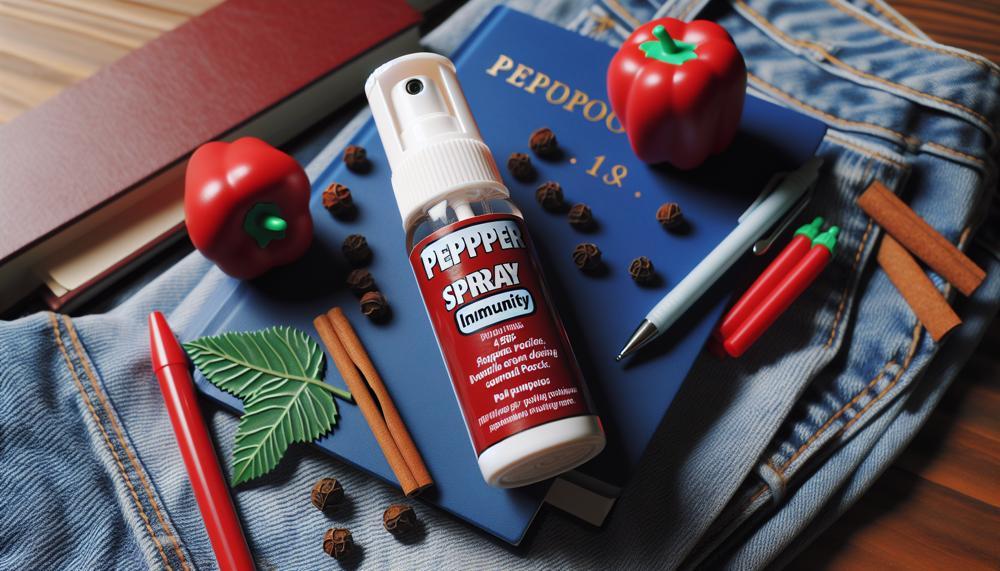
Bliss Ferdinand’s passion for self-defense has inspired numerous women to take charge of their own security. Her commitment to her community has established her as a reliable source for personal safety information, especially in using pepper spray as a self-defense tool.
Tips for Safely Purchasing and Carrying Pepper Spray
To ensure the safe and effective purchase of pepper spray for self-defense, it is crucial to follow these tips:
| Gain a thorough understanding of the potency, functionality, and usability of different types of pepper sprays. | Make an informed decision by researching the various pepper sprays available in the market. Consider their potency, functionality, and ease of use in different situations. |
| Look for sprays with a high SHU (heat level). | The higher the SHU (Scoville Heat Units), the more effective the pepper spray will be in incapacitating an attacker. Look for sprays with a minimum of 2 million SHU. |
| Consider the spray pattern. | Choose a spray pattern (cone, stream, or foam) based on your environment and situation. Streams are ideal for longer distances, while cones and foams are more effective in close-range situations. |
| Opt for a compact size. | A compact size that is convenient to carry, such as one that can attach to a keychain or fit in a pocket, is ideal for self-defense purposes. |
| Check for safety features. | Ensure that the pepper spray has safety features to prevent accidental discharge, such as a safety lock or trigger guard. |
| Consider additional features. | Some sprays have additional features like dye or keychain attachments, which can be useful in identifying attackers or making it easily accessible in times of need. |
| Familiarize yourself with local laws and regulations. | Prior to purchasing pepper spray, it is essential to be well-informed about the laws and regulations governing its possession and use in your area. |
| Aim accurately and use short bursts. | Aim for the attacker’s face and use short bursts of 1-2 seconds to incapacitate them for up to 45 minutes. It is important to remember that pepper spray should only be used as a self-defense tool, not as an offensive weapon. |
| Escape and call for help. | After using pepper spray, it is crucial to escape immediately and call for help. Do not engage in any further confrontation. |
| Check the expiration date. | Pepper spray typically has a shelf life of 3-5 years, so be sure to check the expiration date before making a purchase. |
Conclusion
In summary, it is not possible to become immune to pepper spray, despite claims that repeated exposure can build tolerance.
The potency of this self-defense weapon should never be underestimated, and it is essential to handle it responsibly and with proper training. While adaptation may offer some level of protection, it does not guarantee complete immunity.
Therefore, it is crucial to understand the potency, functionality, and safety features of pepper spray before purchasing and carrying it. Familiarizing oneself with local laws and regulations is also necessary.
By keeping these tips in mind, you can confidently equip yourself with this powerful tool for personal safety.
